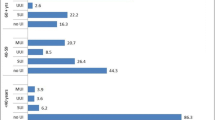Abstract
Introduction and hypothesis
High levels of mental health dysfunction have been identified in women with genital tract fistula. The aim of this study was to use the General Health Questionnaire-28 (GHQ-28) to screen women in western Uganda with severe pelvic organ prolapse, chronic fourth-degree obstetric tear and genital tract fistula for risk of mental health dysfunction.
Methods
Women undergoing surgery for severe pelvic organ prolapse, chronic fourth-degree obstetric tear, and genital tract fistula were interviewed using the GHQ-28 to screen for the risk of mental health dysfunction.
Results
A total of 125 women completed the GHQ-28, including 22 with pelvic organ prolapse, 47 with fourth-degree obstetric tear, 21 with genital tract fistula, and 35 controls. Nearly all women with these serious gynaecological conditions were positive for the risk of mental health dysfunction. In the domain assessing symptoms of severe depression, women with fourth-degree obstetric tear and genital tract fistula scored higher than women with pelvic organ prolapse.
Conclusions
A significant risk of mental health dysfunction was identified in women with severe pelvic organ prolapse and chronic fourth-degree obstetric tear. These rates are similar to the high rates of mental health dysfunction in women with genital tract fistula. Identification and management of mental health dysfunction in women with these conditions should be a priority.
Similar content being viewed by others
References
Murray CJL, Vos T, Lozano R, Naghavi M, Flaxman AD, et al. Disability-adjusted life years (DALYs) for 291 diseases and injuries in 21 regions, 1990–2010: a systematic analysis for the Global Burden of Disease Study 2010. Lancet. 2012;380:2197–2223.
Mitchell AJ, Chan M, Bhatti H, Halton M, Grassi L, Johansen C, et al. Prevalence of depression, anxiety, and adjustment disorder in oncological, haematological, and palliative-care settings: a meta-analysis of 94 interview-based studies. Lancet Oncol. 2011;12:160–174.
Wilhelm K, Mitchell P, Slade T, Brownhill S, Andrews G. Prevalence and correlates of DSM-IV major depression in an Australian national survey. J Affect Disord. 2003;75:155–162.
Department of Health. Quality & outcomes framework. Belfast: Department of Health; 2004.
National Institute for Health and Clinical Excellence. The guidelines manual. London: National Institute for Health and Clinical Excellence; 2008.
Goh JT, Sloane KM, Krause HG, Browning A, Akhter S. Mental health screening in women with genital tract fistulae. BJOG. 2005;112:1328–1330.
Goldberg DP, Hillier VF. A scaled version of the general health questionnaire. Psychol Med. 1979;9:139–145.
Meader N, Mitchell AJ, Chew-Graham C, Goldberg D, Rizzo M, Bird V, et al. Case identification of depression in patients with chronic physical health problems: a diagnostic accuracy meta-analysis of 113 studies. Br J Gen Pract. 2011;61:e808–e820.
Bump RC, Mattiasson A, Bø K, Brubaker LP, DeLancey JO, Klarskov P, et al. The standardization of terminology of female pelvic organ prolapse and pelvic floor dysfunction. Am J Obstet Gynecol. 1996;175:10–17.
Üstün B, Sartorius N. Mental illness in general health care: an international study. Chichester: Wiley; 1995.
McDowell I, Newell C. Measuring health: guide to rating scales and questionnaires. New York: Oxford University Press; 1996.
Weston K, Mutiso S, Mwangi JW, Qureshi Z, Beard J, Venkat P. Depression among women with obstetric fistula in Kenya. Int J Gynecol Obstet. 2011;115:31–33.
Wilson SM, Sikkema KJ, Watt MH, Masenga GG. Psychological symptoms among obstetric fistula patients compared to gynecology outpatients in Tanzania. Int J Behav Med. 2015;22:605–613.
U.S. Preventive Services Task Force. Screening for depression: recommendations and rationale. Ann Intern Med. 2002;136:760–764.
Watt MH, Wilson SM, Sikkema KJ, Velloza J, Mosha MV, Masenga GG, et al. Development of an intervention to improve mental health for obstetric fistula patients in Tanzania. Eval Program Plann. 2015;50:1–9.
Rogers GR, Villarreal A, Kammerer-Doak D, Qualls C. Sexual function in women with and without urinary incontinence and/or pelvic organ prolapse. Int Urogynecol J Pelvic Floor Dysfunct. 2001;12:361–365.
Lowder JL, Ghetti C, Nikolajski C, Oliphant S, Zyczynski H. Body image perceptions in women with pelvic organ prolapse: a qualitative study. Am J Obstet Gynecol. 2011;204:441.e1–441.e5.
Nyaard I, Turvey C, Burns TL, Crischilles E. Urinary incontinence and depression in middle-aged United States women. Obstet Gynecol. 2003;101:149–156.
Zorn BH, Montgomery H, Pieper K, Gray M, Steers WD. Urinary incontinence and depression. J Urol. 1999;162:82–84.
Melville JL, Delaney K, Newton K, Katon W. Incontinence severity and major depression in incontinent women. Obstet Gynecol. 2005;106:585–592.
Ghetti C, Skoczylas LC, Oliphant SS, Nikolajski C, Lowder JL. The emotional burden of pelvic organ prolapse in women seeking treatment: a qualitative study. Female Pelvic Med Reconstr Surg. 2015;21:332–338.
Zeleke BM, Ayele TA, Woldetsadik MA, Bisetegn TA, Adane AA. Depression among women with obstetric fistula, and pelvic organ prolapse in northwest Ethiopia. BMC Psychiatry. 2013;13:236.
Krause HG, Natukunda H, Singasi I, Hicks SS, Goh JT. Treatment-seeking behaviour and social status of women with pelvic organ prolapse, 4th-degree obstetric tears, and obstetric fistula in western Uganda. Int Urogynecol J. 2014;25:1555–1559.
Groutz A, Cohen A, Gold R, Hasson J, Wengier A, Lessing JB, et al. Risk factors for severe perineal injury during childbirth: a case–control study of 60 consecutive cases. Colorectal Dis. 2011;13:e216–e219.
Kumar R, Ooi C, Nicoll A. Anal incontinence and quality of life following obstetric anal sphincter injury. Arch Gynecol Obstet. 2012;285:591–7.
Lindqvist P, Jernetz M. A modified surgical approach to women with obstetric anal sphincter tears by separate suturing of external and internal anal sphincter. A modified approach to obstetric anal sphincter injury. BMC Pregnancy Childbirth. 2010;10:51.
Ramalingam K, Monga AK. Outcomes and follow-up after obstetric anal sphincter injuries. Int Urogynecol J. 2013;24:1495–1500.
Author information
Authors and Affiliations
Corresponding author
Ethics declarations
Financial disclaimer
None.
Conflicts of interest
None.
Rights and permissions
About this article
Cite this article
Krause, H.G., Hall, B.A., Ng, SK. et al. Mental health screening in women with severe pelvic organ prolapse, chronic fourth-degree obstetric tear and genital tract fistula in western Uganda. Int Urogynecol J 28, 893–897 (2017). https://doi.org/10.1007/s00192-016-3177-3
Received:
Accepted:
Published:
Issue Date:
DOI: https://doi.org/10.1007/s00192-016-3177-3




